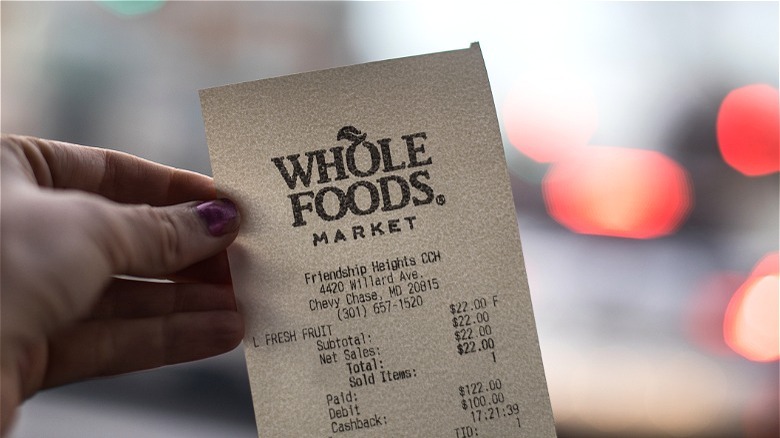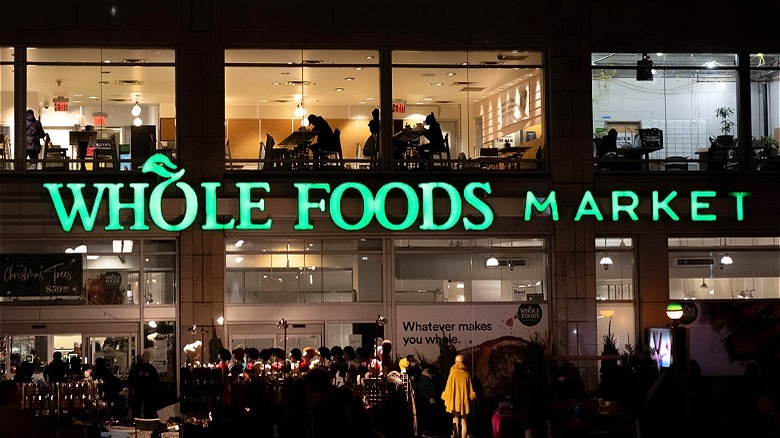Is Whole Foods Still The Most Expensive Grocery Store?
If you're familiar with Whole Foods Market, then you're probably also privy to the assumptions made about its customers — ones directly tied to the retailer's high-price reputation. Yet with inflation raging over the last few years and prices still on the rise, is Whole Foods still considered expensive? Even though the niche grocer was founded on one college dropout's purported commitment to fresh, natural food, Whole Foods has experienced a fair number of setbacks due to various cost discrepancies in the mid-2000s — not to mention the elitist mantra the store has become synonymous with over the years.
In 2015, The New York Times reported that the New York Department of Consumer Affairs discovered an outrageous amount of overcharges at certain retail locations in Manhattan. The following year, Whole Foods' private label 365 was used to debut a more affordable, small-scale version of the health-focused grocery store. Plans changed with Amazon's acquisition, and their newly-minted, combined force soon after made a new commitment to finally make grocery prices "affordable for everyone," per a press release issued by both companies at the time.
But now, considering the curveball inflation has thrown at most Americans, has Whole Foods lived up to its cost-effective promise to consumers? Before taking a look at the natural food store's prices in the present-day market, it's imperative to factor in whether or not Whole Foods measured up during the inflationary crisis of 2022.
The impact of inflation on Whole Foods' prices
As a specialized market, Whole Foods has seen ups and downs in price adjustments over the years. In 2019, Insider conducted a price comparison that zeroed in on an allotted number of products sold at both Kroger and Whole Foods. Ultimately, the outlet's report found better value for certain items like fresh fruits and vegetables at the upscale health food store. However, while there may have been a few foods that were unchanged by inflation, the price increases on food, energy, and transportation in late 2021 and the entirety of 2022, by and large, took (and has continued to take) a toll on many businesses — and Whole Foods was no exception.
According to the U.S. Bureau of Labor Statistics, food at home increased by 11.3% over the last year measured from January 2022 to January 2023. Another survey conducted by the digital ad company InMarket — one which specifically homed in on Whole Foods' Q4 business in 2021 — found a 15% decrease with regard to in-store visits. Per its findings, the natural food store had more one-off visitors buying specialty items than loyal customers shopping for a full week's worth of groceries.
InMarket blamed the lower incidence of store visits on the perception held by mainstream consumers that Whole Foods is not only high-cost, but too high-cost. But with inflation possibly tapering off in the near or distant future, is Whole Foods now taking extra measures to improve costs?
Whole Foods' stance in the current market
Despite fewer shoppers, Whole Foods purportedly remains committed to drawing in customers through local business acquisition and growing the brand's private label offerings. Even so, there is conflicting evidence as to whether or not Whole Foods is America's most expensive grocer in 2023. (For instance, one grocery broker revealed to Insider in October 2022 that newer, branded items within various Whole Foods locations were undergoing price hikes.) Uncertainty about why some stores raised the cost of these items and others remain unanswered.
Regardless, people are still shopping at the upscale grocer, as reports suggest that Whole Foods' brick-and-mortar sales were up almost 6% at the end of last year. And while there may be value-friendly items worth buying, the upscale natural food store might be doing its part to reduce costs for customers: At the end of January 2023, The Wall Street Journal reported Whole Foods' announcement to lower prices by asking suppliers to in turn lower their overall costs. Whole Foods' chief executive officer, Jason Buechel, even stated he is equally ready to expand customers' in-store experiences and continue to offer a multitude of locally branded products.
As to whether or not you'll notice a difference in next month's grocery bill is less than likely, given inflations unrelentingly slow yet steady squeeze on Americans' bank accounts. In the end, depending on what you buy, Whole Foods may still cost more on average — but with the retailer's recent moves to allegedly commit to lowering the cost of the wares, we'll see what's next.


